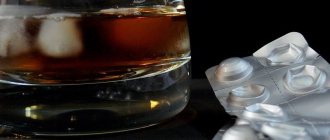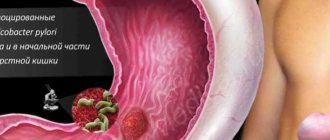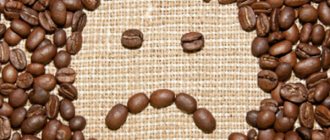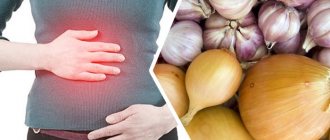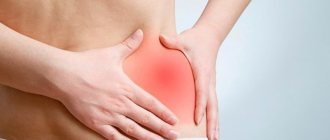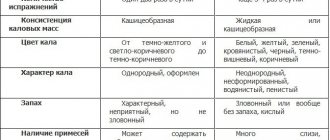Why does my stomach hurt?
There are many diseases that cause pain in or near the stomach. It is important for the doctor to determine the nature and location of the pain. Here is a list of some diseases and a description of the nature of the accompanying pain:
- pancreatitis, cholecystitis and duodenal ulcer cause sharp pain in the stomach area. Pain, which patients characterize as acute, usually indicates ulcer perforation (the appearance of a hole in a hollow organ due to a chronic pathological process in its wall). This can happen with a stomach or duodenal ulcer;
- gastritis and stomach ulcers are usually accompanied by a burning sensation in the epigastrium (the part of the abdominal cavity below the breastbone). If the process becomes chronic, the pain becomes dull and aching. With gastritis and ulcers, there is a clear relationship with food intake: pain appears a couple of hours after eating or on an empty stomach;
- “shooting” pain, short-lived (a couple of seconds), which occurs when inhaling or quickly getting out of bed, is characteristic of diaphragm spasm. A spasm is provoked by a violation of the blood supply to the diaphragm;
- patients with malignant tumors in the stomach complain of mild but constant pain. If the tumor has metastasized to the pancreas, the pain turns into shingles;
- Poisoning is characterized by sharp, severe, cramping pain in any part of the abdomen;
- Colitis (inflammation of the large intestine) is accompanied by intense pain in the upper abdomen, which usually subsides after a few days, but does not disappear completely.
These are the most common causes of abdominal pain. An accurate diagnosis can only be made by a doctor after certain diagnostic tests. In addition to the above conditions, pain occurs with dissection of the abdominal aorta, trauma after a blow to the stomach and intestines. There are cases when the pain from a heart attack moves to the epigastric region. The main symptoms of gastritis of the stomach: heartburn, vomiting, belching, frequent release of gas, bloating, headache, rapid heartbeat, dizziness, increased salivation or extreme thirst; chronic gastritis is sluggish.
Some diseases require quick response and immediate surgical intervention to save the patient's life. For example, if surgery is not performed in time for perforation of a stomach or duodenal ulcer, complications develop (peritonitis, sepsis) that directly threaten the patient’s life.
Important! If you have abdominal pain of any location, you should not take painkillers. The nature of the pain will tell the doctor which organ to check, and the spontaneous disappearance of pain may indicate that the pathological process is progressing and something needs to be done urgently, although subjectively the patient will feel that he is feeling better. A similar condition can occur with ruptured appendicitis.
Pancreatitis: causes and symptoms
Continuing to study the organs of the gastrointestinal tract, one cannot help but dwell on the pancreas. Not all people know about this organ.
By the way, the cause of pancreatitis (inflammation of the pancreas) is most often alcohol abuse.
It is a mistake to believe that the greatest impact is on the liver. While the liver has protective enzymes, the pancreas does not. Therefore, it cannot protect itself from toxins.
If we continue to study the causes of pancreatitis, we can highlight poor nutrition. Fried and floury foods force the pancreas to work at full capacity, causing it to produce enzymes. Of course, she will cope with such work, but for the time being. One day this organ may fail.
Symptoms of pancreatitis:
- nausea
- heartburn
- bowel dysfunction
In addition, the pancreas is negatively affected by taking medications, especially hormonal ones. This is why pancreatitis can be diagnosed in both adolescents and young girls.
A malfunction of the pancreas leads to the development of an equally dangerous disease - diabetes mellitus.
Therefore, remember that all internal organs are interconnected with each other, and you need to take care of the condition of the whole organism.
Symptoms of gastritis
Let's take a closer look at gastritis. What kind of disease is this and what other symptoms, besides pain, may indicate this diagnosis? Gastritis is an inflammation of the inner surface of the stomach that occurs due to a number of reasons. The main provoking factors of gastritis are:
- unhealthy diet (lots of fatty and fried foods, one meal per day);
- drinking large quantities of alcoholic beverages;
- chronic stress;
- smoking;
- use of medications that affect the stomach, for example, non-steroidal anti-inflammatory drugs (aspirin, ibuprofen);
- exposure to the bacterium Helicobacter pylori.
It is usually difficult to single out one cause, since the disease develops due to a combination of the above factors.
Signs of gastritis:
- pain is the main complaint of patients with gastritis. Patients indicate the localization of pain in the epigastric region (epigastric region). Most often, pain occurs several hours after eating food. There are also hunger pains (pain that appears on an empty stomach or after a long period after eating). Unpleasant sensations intensify if the patient eats fried, spicy, sour or hot;
- belching, flatulence;
- rumbling in the stomach;
- heaviness in the stomach;
- nausea, vomiting;
- tongue coated with white coating;
- slight increase in body temperature (up to 37 degrees);
- discomfort in the stomach that does not go away throughout the day.
As mentioned above, many factors can provoke gastritis. One of the leading ones is the bacterial theory, where the bacterium Helicobacter pylori plays a decisive role in the development of the disease. However, an incorrect diet (for example, one or two meals per day), an addiction to a certain type of food (spicy or fried foods) irritate the gastric mucosa, causing a pathological process.
Symptoms of the disease
Increased stomach acidity is accompanied by pain in the abdominal area.
Increased stomach acidity is an ailment that has a huge number of symptoms. Typically, the symptoms of the pathology are limited to:
- pain of varying severity in the abdominal area, intensifying after eating after 2-3 hours;
- severe burning behind the sternum, otherwise heartburn;
- sour belching and unpleasant taste in the mouth;
- nausea and vomiting;
- intestinal colic and increased constipation;
- the presence of a grayish-white coating on the tongue;
- increased drowsiness and fatigue.
At first, you can stop such symptoms without even thinking about it, but if its manifestations are systematic, then you should think about visiting the clinic. Remember that a professional gastroenterologist and special examinations will allow you not only to diagnose the pathology, but also to organize its correct treatment.
In the case of high stomach acidity, this is quite important.
Chronic gastritis
Acute gastritis is an acute condition caused by a single influence of irritants (harmful microorganisms, poor-quality food, chemicals) on the gastric mucosa. An inflammatory process occurs. In this case, diet and drug treatment are indicated. If all rules are followed and effective treatment, acute gastritis will remain a thing of the past for the patient. Under the influence of certain factors (poor nutrition, chronic stress), periods of exacerbation become constant. This means that the process has become chronic.
There is usually a seasonality of exacerbations. Patients are admitted to the hospital with exacerbation in the fall and spring. This is due to decreased immunity during these months, the ability to resist bacteria is lower, which leads to inflammation of the mucous membrane.
Chronic gastritis often worsens during a stressful situation. People who do not know how to adequately regulate their emotional state constantly experience stomach pain.
In order for a doctor to diagnose chronic gastritis, the patient must undergo a series of examinations:
- gastroscopy - examination of the esophagus and stomach using a special probe equipped with a camera;
- pH-metry – monitoring of stomach acidity for a day or more. The method allows you to detect inflammation and determine the nature of gastritis (hyperacid or hypoacid);
- examination of gastric juice, which is collected by a probe;
- respiratory test to detect the bacterium Helicobacter pylori;
- biopsy of the gastric mucosa at the site of the pathological process to establish a more accurate diagnosis;
- Ultrasound;
- X-ray examination;
- blood test to look for antibodies to pathogenic microorganisms.
Acute gastritis usually does not lead to complications. This is a characteristic feature of a chronic process. Among the complications it is worth highlighting:
- anemia (develops due to chronic bleeding due to damage to the stomach wall);
- peptic ulcers;
- benign or malignant tumors.
Cancer may be indicated by changes in the usual course of chronic gastritis - a change in the location of pain and its nature. You should consult a doctor immediately if you have additional symptoms: black feces, pale skin, frequent dizziness and headaches, fainting, tachycardia, shortness of breath. This may indicate a complication of gastritis.
Is it possible or not?
To understand whether it is possible to drink coffee with pancreatitis, a few words should be said about the reasons for its development. This disease is characterized by inflammation of the pancreas and damage to its cells, which reduces the synthesis of digestive enzymes and disrupts the digestion process.
The more a person consumes “heavy” foods, the higher the load on the pancreas and the more its cells are damaged. Therefore, when pancreatitis develops, doctors strongly recommend adhering to a strict diet, even during periods of remission, in order to avoid progression of the disease and the appearance of complications against it.
They recommend giving up all types of fatty, fried and smoked foods, pickles, baked goods, fatty dairy and fermented milk products, alcohol, carbonated drinks, etc., because all of them can provoke an exacerbation of pancreatitis and the occurrence of a painful attack.
As for coffee, it itself cannot provoke the development of this disease. Therefore, every healthy person must decide for himself whether to drink this drink or not. However, it is a completely different matter with people who have a chronic form of pancreatitis, since this drink contains caffeine, which has a stimulating effect on the central nervous system and causes internal organs to work at an accelerated rate. And this is also an additional burden on the pancreas and can lead to exacerbation.
Excessive coffee consumption can lead to exacerbation of pancreatitis
However, this does not always happen. It all depends on the individual characteristics of the patient’s body. Therefore, with the question of whether coffee is ok for pancreatitis or not, it is better to go to the doctor. The thing is that some patients may experience a painful attack even after drinking one cup of coffee, while others drink it constantly and feel quite normal.
But according to doctors, even if coffee is well tolerated by the body, you should not drink it on an empty stomach. And again, due to the presence of caffeine in it, which very quickly activates the digestive processes in the body, increases appetite and stimulates the production of digestive enzymes.
And since at this moment a person does not eat food, these enzymes begin to digest the digestive organs. All this happens slowly and a person may not feel any changes in his condition. But after a while, health problems appear.
Therefore, drinking coffee for chronic pancreatitis and cholecystitis is recommended only after a light breakfast. This will avoid exacerbation of the disease and the appearance of other problems with the digestive system.
How to treat gastritis?
The basis of drug treatment for hyperacid gastritis (inflammation of the mucous membrane against the background of increased pH in the stomach) is to reduce gastric acidity. The desired effect is achieved by a number of medications:
- Antacids are medications that reduce stomach acidity, as well as adsorbing enzymes responsible for digesting food and producing hydrochloric acid (for example, pepsin). Antacids are available in the form of tablets, powders, gels and suspensions.
- alginates are drugs that, when reacting with hydrochloric acid, form a special gel covering the surface of the stomach.
To reduce pain, antispasmodics and analgesics are used. Under no circumstances should non-steroidal anti-inflammatory drugs (NSAIDs) be used for gastritis, as they have an ulcerogenic effect (provoke the development of ulcers).
Additionally, gastroprotectors protect the gastric mucosa. Like alginates, these drugs form a thin film on the inner surface of the stomach, which prevents hydrochloric acid from affecting and further damaging the mucous membrane. Gastroprotectors are often prescribed together with antisecretory drugs, since the latter themselves are capable of influencing the development of bacteria in the gastric cavity. Antisecretory drugs, such as proton pump inhibitors, reduce the secretion of hydrochloric acid.
One of the causes of gastritis is the bacterium Helicobacter pylori, which means that it is advisable to prescribe antibacterial agents during treatment. However, antibiotics have many side effects and should be used with caution in children and the elderly, pregnant women and mothers during feeding. Along with taking antibiotics, probiotics are prescribed to normalize intestinal function. Antibacterial agents always cause dysbacteriosis.
Prokinetics are drugs that accelerate gastrointestinal motility, namely, they normalize the process of moving food through the stomach and its excretion further into the duodenum. A significant difference from other drugs: prokinetics are used for low gastric acidity, and not for high acidity. These drugs also reduce nausea.
Any drug has contraindications, side effects, and features of use for different ages. Therefore, only a specialist doctor can prescribe medication. For gastritis, a combination of several drugs is usually prescribed to relieve unpleasant symptoms and affect several parts of the process of formation and secretion of hydrochloric acid.
Disease prevention
Increased stomach acidity is not a rare occurrence.
To conclude today’s material, let’s pay attention to how to prevent an increase in acidity after its therapy or if you have a predisposition to this disease. In general, the prevention of pathology is as follows:
- Organize proper nutrition in moderation. That is, it is not necessary to give up all sorts of goodies such as hamburgers or chocolate, but it is necessary to control their consumption.
- Eat small meals. Ideally, meals during the day will be divided into 5-7 pieces.
- After eating, do not overexert yourself and do not lie down on the sofa. Let the food “settle” in your stomach and only then begin to lie down or engage in physical activity.
- Maintain your weight within normal limits. If you have too much, be sure to lose it, otherwise problems with the gastrointestinal tract will not bypass you.
- Quit smoking. This, by the way, is mandatory, since smoke reaching the gastric mucosa has a negative effect on it, increasing the secretion of gastric juice, which is simply unacceptable if the stomach has high acidity.
- Don't abuse alcohol. Here, perhaps, everything is extremely simple and clear.
- Do not wear clothes that tightly compress the abdominal area. This manner of dressing can disrupt the digestion process even in a completely healthy person, which should not be forgotten.
- Try to avoid stress, nervous shock and depression. They often influence the development of disorders in the gastrointestinal tract. Therefore, it is advisable for every person suffering or predisposed to stomach ailments to take care of a consistently normal psycho-emotional state.
In general, the most important information on nutrition, therapy and prevention of high stomach acidity has come to an end. We hope that the material presented today was useful to you and provided answers to your questions. Good health to you!
Diet for gastritis
In addition to taking special medications, a person with gastritis must follow a diet therapy regimen. For gastritis with low acidity, you should eat foods that provoke the secretion of hydrochloric acid, which lowers the pH. To do this, during an exacerbation period, use:
- meat and fish broths from lean meats and fish;
- liquid porridges, soups without solid and rough food particles;
- vegetable puree;
- boiled lean meat, steamed cutlets, baked meat and poultry;
- boiled eggs, omelet;
- cottage cheese.
It is worth giving up milk, which can further reduce acidity.
For gastritis with high acidity, the diet is aimed at neutralizing hydrochloric acid. Also, food should be as gentle as possible so as not to further injure the gastric mucosa. Therefore, patients during periods of relapse should include in their diet:
- milk soup;
- broth with lean meat;
- low-fat milk (can be added to tea);
- boiled or steamed vegetables;
- boiled eggs;
- lean meat, poultry, fish (boiled or baked);
- white crackers.
For each type of gastritis it is prohibited to consume:
- fatty meat and fish and, accordingly, broths made from fatty meat or fish;
- butter dough;
- fresh white and black bread;
- hard-boiled eggs;
- smoked products;
- canned food, pickles;
- spicy dishes;
- hot dishes;
- fresh vegetables and fruits with thick and rough skin;
- confectionery;
- alcohol;
- fast food;
- any carbonated drinks;
- spices, sauces.
Any of the above products will cause even greater stomach irritation and disrupt the positive dynamics of therapy. Each prepared dish should be easy to digest. It is advisable to grind food to help the stomach digest it as much as possible.
A strict diet for chronic gastritis is followed until the symptoms disappear. This takes from a month to two. Further, the menu expands significantly, but the basic rules should be followed to prevent aggravation. Regardless of the stage of the disease, nutrition should be complete, filled with vitamins, microelements, balanced in proteins, fats and carbohydrates.
For low and high stomach acidity
Coffee for gastritis with high acidity is one of the items on the list of prohibited foods. The drink brewed from coffee beans contains not only caffeine, but also an ester called chlorogenic acid. Even a person with a healthy stomach can feel its adverse effects. The inflamed mucous membrane reacts to the impact of the chlorogen compound with severe irritation, which results in a burning sensation in the esophagus and stomach cramps. In this case, it is better to pay attention to coffee substitutes - plant products that have a similar appearance and taste to coffee.
A coffee drink can be regarded as a means of increasing the secretion of gastric acid, but this does not mean that its uncontrolled consumption is indicated for people suffering from its deficiency. By following certain recommendations, coffee lovers with hypoacid gastritis can occasionally enjoy a flavorful drink by diluting the hot liquid with milk or low-fat cream. Dairy products partially neutralize the acidic environment of coffee and also help reduce the temperature of the drink.
Important: if you have gastritis with any deviation in acidity, you should not drink instant coffee or coffee prepared using a French press. Such a product will be distinguished by excessive acid content, which provokes heartburn and epigastric pain.
Coffee for gastritis
Is it possible to drink coffee if you have gastritis? Doctors usually recommend giving up your favorite drink completely. This is due to the ability of caffeine, chlorogenic acids and other substances in coffee to irritate the stomach and increase acidity. Regular consumption of coffee for gastritis, especially on an empty stomach, will worsen the pathological process and the formation of ulcers.
However, there are several recommendations that will help you drink the drink even with an inflamed gastric mucosa:
- You should not drink coffee on an empty stomach. Only after eating, after at least half an hour, and preferably an hour. Substances in coffee cause the secretion of hydrochloric acid. If food does not enter the stomach along with coffee, then the acid simply begins to affect the walls of the organ;
- coffee should not be hot or cold. A warm drink will pass through the stomach as gently as possible;
- Instead of instant coffee, it is better to drink natural grain coffee. Instant drinks contain tannins, which further injure the walls of the stomach;
- coffee should not be strong;
- During the day, the number of cups of coffee drunk should not exceed two.
Coffee is allowed to be consumed for hypoacid (low acidity) gastritis. However, you should still drink it in small quantities. Also, for gastritis with low acidity, it is recommended to drink chicory, as this plant affects the production of hydrochloric acid. But it should be understood that chicory is strictly contraindicated for people with hyperacid gastritis.
For hyperacid (high acidity) gastritis, it is recommended to add milk to coffee. It cools the drink and makes its effect on the mucous membrane softer. Coffee can be replaced by cocoa, which has a number of beneficial properties for the body (increasing tone and improving mood due to the presence of endorphins).
If the disease worsens, it is better to avoid coffee altogether. This will help restore the gastric mucosa as quickly as possible, without stretching out this process for many months.
A properly formulated diet will allow you to survive acute gastritis without consequences. When the process becomes chronic, proper nutrition reduces the risk of exacerbation even in autumn and spring. Diet for this disease is an important part of therapy, without which it is almost impossible to achieve good results. Compliance with the diet will significantly improve the patient’s quality of life.
Drinking coffee without harming your health
Many people are unable to resist a cup of aromatic drink at the beginning of their working day. This affects both performance and general well-being. By following the recommendations, you can avoid unwanted consequences for the body, without denying yourself pleasure.
Is it possible to drink jelly if you have gastritis?
- The coffee drink should not be prepared from instant raw materials. It is preferable to use natural beans processed in a coffee grinder (for example, Arabica varieties). When brewing coffee, it is better to use special disposable filters;
- In order to neutralize the harmful effects of caffeine, it is recommended to add a little milk to the liquid;
- It is forbidden to drink a tonic drink before breakfast. The most appropriate time is no less than 30 minutes after eating. During this period, hydrochloric acid is already involved in food processing, thereby minimizing the harmful effects of caffeine on the gastric mucosa;
- Do not forget that hot water also causes harm to the digestive organ. That is why coffee lovers who have gastrointestinal problems are advised to dilute the scalding liquid with cool water (the optimal temperature of prepared coffee is about 60 degrees);
- To avoid unwanted consequences, the invigorating drink can be consumed only once a day in the morning.
The coffee that a person with gastritis drinks should not be brewed strongly.
Having noticed that, despite the measures taken, unpleasant sensations are observed in the epigastric area after drinking coffee, this product should be abandoned altogether. The appearance of heartburn, nausea and a sour taste in the mouth are symptoms of an increased level of hydrochloric acid in the gastric juice. An invigorating drink has a stimulating effect on its already excessive production, which can lead to consequences more serious than gastritis.
Important: if chronic inflammation in the stomach worsens, it is recommended to give up even a small amount of coffee drink.
Popular questions
1. How to relieve pain with gastritis?
Exacerbation of gastritis is often associated with increased acidity of gastric juice. Medicines that reduce stomach acidity will help relieve pain due to gastritis. Medicines for the treatment of abdominal pain are prescribed by the doctor after examination and receipt of examination results.
2. What to do if your stomach hurts?
In order to relieve stomach pain, you need to see a doctor and undergo an examination to identify the causes of stomach pain and disturbances in the digestive process. Based on the examination results, the doctor will be able to make a diagnosis and prescribe the correct treatment.
3. How to quickly cure gastritis?
The methods and duration of treatment for gastritis depend on the severity and cause of the disease. In case of acute gastritis of an infectious nature (food poisoning), gastric lavage and restoration of fluid loss will help. Treatment of chronic gastritis is longer-term with the use of antibacterial drugs and drugs that reduce the acidity of gastric juice.
7
1
5
Article rating:
4.49 out of 5 based on 35 ratings
Author: Frolova Elina Yurievna
Gastroenterologist. Highest category. Work experience 22 years. Candidate of Medical Sciences.
Barley coffee as an alternative to natural coffee
When deciding whether to drink coffee if you have gastritis, think about the alternatives. A hundred years ago, Soviet researchers conducted a series of experiments with drinks based on barley grain. As it turned out, a drink made from barley has a general strengthening effect and is useful for people exposed to stress and physical activity. Barley coffee is introduced into the diet for recovery after severe infectious diseases, injuries and operations.
Effect on digestion
Barley and barley products are an indispensable component of therapeutic nutrition for a number of diseases of the gastrointestinal tract. The product is useful for biliary dyskinesia, dysbiosis, pancreatitis.
Biological substances in barley grains cleanse the intestinal cavity and restore the mucous membrane of the digestive canal. The cereal has a choleretic effect.
The complex high-molecular carbohydrates contained in barley grains act as a nutrient medium for the development of normal intestinal microflora. Barley has a beneficial effect on dysbacteriosis and improves immunity.
How to drink coffee correctly
In order not to harm their health, when drinking a coffee drink, people suffering from various forms of gastritis adhere to several rules:
- drink coffee only with milk or low-fat cream: the drink must be diluted. Drinking a black drink provokes an attack;
- The drink is taken weak and warm. A drink that is too cold or too hot will negatively affect the gastric mucosa;
- drink only natural coffee;
- it is allowed to be taken once or twice during the day;
- For stomach gastritis, experts recommend drinking an aromatic invigorating composition only half an hour after eating. It is taken into account that hydrochloric acid will be released for about an hour, digesting food.
It is not recommended to drink coffee during meals or wash down food with it. In this case, the drink is mixed with hydrochloric acid and thereby prevents the enzymes from fully carrying out the primary digestion of food. The coffee drink is not included in the list of permitted products during exacerbation of gastritis and the erosive form of the disease. Failure to comply with these rules risks chronic inflammation of the stomach.
We recommend: Does psychosomatics affect the stomach? - psychological causes of gastritis
What harm can coffee cause?
The drink contains caffeine, which has an invigorating effect, and their lorogenic acids, which contribute to the creation of an acidic environment, which can cause irritation of the stomach walls and is dangerous for patients suffering from gastritis.
We recommend: What is reflux gastritis and can it be cured?
A full cup of coffee, not diluted with skim cream or not prepared with milk, is enough for gastritis to cause a person to feel the symptoms of heartburn and pain in the stomach. These are signs of irritation of its mucous membrane. Drinking the drink on an empty stomach is especially dangerous. This organ actively produces hydrochloric acid, which is necessary for digesting food, and the coffee composition further enhances this acidic environment. And since there is nothing to digest, it affects the gastrointestinal tract’s own tissues, causing pain in the stomach.
Such “breakfasts” on an empty stomach with one drink not only contribute to the development of gastritis, but can also “give” peptic ulcers and even lead to cancer. There is no coffee that can have a harmful effect on the human digestive system; there is a problem of its illiterate consumption.
